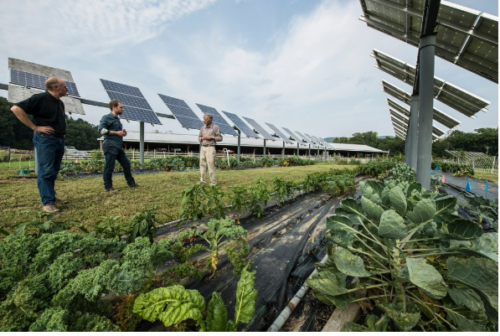The National Center for Appropriate Technology (NCAT) will launch an online information clearinghouse in 2021 to promote solar-energy development on agricultural lands while protecting — and even improving — those lands’ agricultural capacity.
NCAT was selected for a $1.6 million cooperative agreement from the U.S. Department of Energy to develop the Agri-Solar Clearinghouse (ASC), a national information hub and professional network that connects researchers, technology companies, solar developers, landowners, farmers and consumers.
“Federal energy planners estimate that utility-scale solar installations could cover almost 2 million acres of land in the United States by 2030,” said Stacie Peterson, Ph.D., director of NCAT’s energy programs.
“Under traditional solar development, these lands could be taken over for energy-only production and this could lead to negative impacts on food production,” Peterson said. “However, there is tremendous opportunity for low-impact solar development that is complementary with sustainable agriculture, increasing pollinator habitat, improving soil health, and promoting native species, all while diversifying revenue streams for both agricultural and solar operations.”
“NCAT’s decades of experience in sustainable energy and agriculture will enable the group to work as an honest broker of co-location information,” said Peterson.
“Together, with our incredible network of partners, we hope to help promote the co-location of solar and agriculture in a way that is beneficial to both throughout the United States and territories.”

National Renewable Energy Laboratory researchers Jordan Macknick and Paul Torcelini along with UMass professor Stephen Herbert survey the test plot at the UMass Crop Animal Research and Education Center in South Deerfield, MA.
— Photo by Dennis Schroeder, NREL 53126
ASC will showcase and develop practical, affordable solar-energy solutions through research, success stories, case studies, and multi-media outreach. The project will also connect participants through an online forum, mailing list, workshops and farm tours to facilitate peer-to-peer exchanges and mentoring.
ASC also will have databases that help locate financial and technical assistance, as well as identify best practices, explain regulatory issues and provide policy information.
The Solar Energy Technologies Office (SETO) of the U.S. Department of Energy will provide a three-year, $1.6 million cooperative agreement to help fund the project. The total budget of the project for three years is $2,030,000.
NCAT has a number of partners in the project, including Argonne National Laboratory, Bozeman Green Build, Breezy Point Energy, Center for Rural Affairs, Fresh Energy Center for Pollinators in Energy, George Washington University, Helical Solar Solutions, Montana Renewable Energy Association, Oak Ridge National Laboratory, Renewable Northwest, Ridge to Reefs, Seeta Sistla, Smithsonian Conservation Biology Institute, Virginia Working Landscapes, and Wexus Technologies.
ASC is expected go live in the summer of 2021.
The SETO program provided a total of $130 million in fiscal year 2020 for projects that improve the affordability, reliability, and value of solar technologies on the U.S. power grid.
NCAT’s project is one of four that focus on siting solar-energy systems in agricultural settings. The four projects were funded at a total of $7 million. Their aim is to help farmers, ranchers, and other agricultural enterprises gain value from solar technologies while keeping land available for agricultural purposes.
NCAT is a national nonprofit, founded in 1976, with a mission of helping people build resilient communities through local and sustainable solutions that reduce poverty, strengthen self-reliance, and protect natural resources.
It is headquartered in Butte, Mont., and has five regional offices around the country.
NCAT’s team of 35 sustainable agriculture specialists and energy engineers, along with its partners, will develop the clearinghouse. NCAT will develop alternate funding streams to ensure ASC will continue after the three-year funding period.

